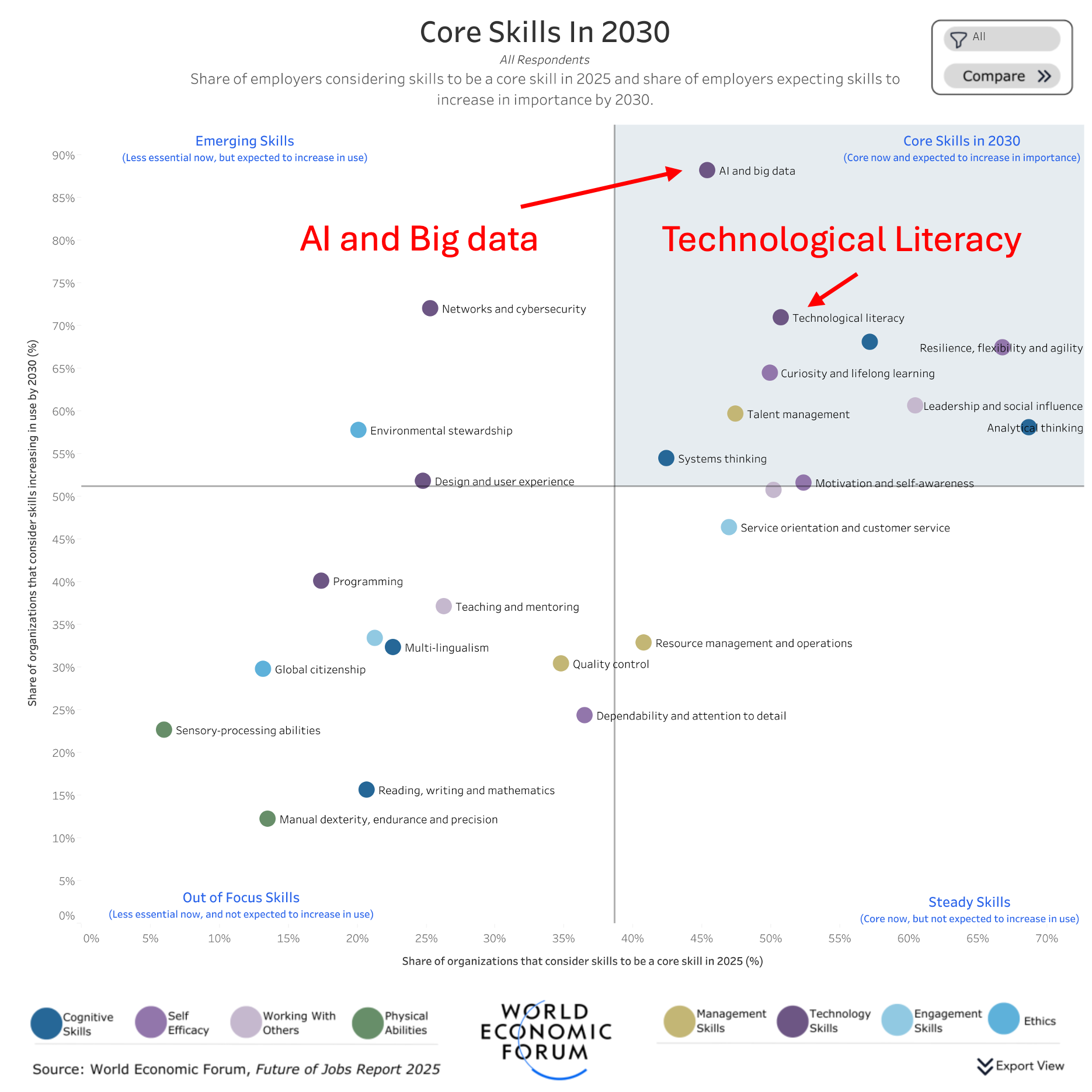I wrote this post to share key insights from the World Economic Forum’s Future of Jobs Report 2025. I added a section explaining why AI should be separated from Big Data — with the rise of GenAI, many users and developers work with AI without touching Big Data. The report also highlights a growing need for training in tech literacy by 2030.
🔮 The Future of Skills — World Economic Forum 2025 Insights
The Future of Jobs Report 2025 delivers critical insights into how the skills landscape is evolving by 2030. Here's a snapshot of what matters most for the future of work.
📌 Key takeaways
- Major trends: AI and Big data (I also add: Technological Literacy)
- Over 90% of respondents expect AI and Big data to increase in use
- 39% of core skills are expected to change by 2030
- 50% of workers in 2025 have completed training (up from 41% in 2023)
- Manual dexterity, endurance, and precision stands out with a notable anticipated net decline, with 24% of respondents foreseeing a decrease in its importance.
💼 Core Skills in 2030
In the Future of Jobs Report 2025, the top-right quadrant identifies the power skills that are already essential today and expected to grow even more by 2030. These skills define the future-ready workforce:
- AI and Big data 🤖 : Driving automation, innovation, and next-gen productivity across sectors. Enabling informed decision-making through advanced data analysis and insights
- Technological Literacy 💻 : Understanding and using digital tools effectively to work smarter and stay competitive.
- Curiosity & Lifelong Learning🔍 : A mindset of exploration, openness, and continuous personal and professional growth.
- Analytical Thinking 🧠 : The foundation for problem-solving in complex, data-rich environments.
- Creative Thinking 🎨 : Fueling innovation, product development, and adaptive strategy.
- Resilience, Flexibility & Agility 🌱 : Key to thriving in uncertainty, market shifts, and organizational change.
- Talent Management👥 : Attracting, developing, and retaining the right people while building inclusive and high-performing teams.
📌 Human-centric and adaptive skills are at the heart of future workforce strategies.

⚙️ Drivers of Skill Disruption
Five macrotrends are shaping the future of work:
- Technological change – AI, automation, robotics, and cybersecurity
- Green transition – Environmental stewardship and sustainability-focused skills
- Demographic shifts – Aging populations & emerging workforce talent
- Economic uncertainty – Demands for adaptability and creative thinking
- Geoeconomic fragmentation – New geopolitical dynamics and digital security needs
📉 39% of core skills are expected to change by 2030.
📈 Reskilling & Upskilling Strategies
Organizations are actively investing in training to close the future skills gap:
- 50% of workers in 2025 have completed training (up from 41% in 2023)
- Top industries driving training: Telecom, Insurance, Tech, Supply Chain
- Key goals: Improved productivity, competitiveness, and talent retention
- Main funding sources: Self-funded, public funding, and free learning resources
👉 However, access remains uneven, and 11% of workers are expected to need training they may not receive.
🤖 Why AI Should Be Treated Separately from Big Data?
Although often grouped together, I think that AI and Big Data are evolving as distinct skill sets — and the rise of Generative AI makes that clearer than ever.
Today, almost anyone can build and use an AI agent to work with data without ever touching Big Data infrastructure. GenAI tools have democratized AI, while Big Data remains a highly technical and manual (old) field, often tied to complex cloud computing systems that are notably less visible by end users in current AI workflows.
As I’ve suggested, Big Data may increasingly be seen as a tedious backend operation, while AI becomes the visible, dynamic engine of innovation.
Here’s how they differ:
📌 Artificial Intelligence (AI)
- The fastest-growing skill across nearly all industries
- Powers creativity, automation, system design, and human-machine collaboration
- Requires skills like critical thinking, prompt engineering, and ethical awareness
📊 Big Data and Cloud computing
- Still vital for data-intensive industries (analytics, business intelligence, etc.)
- Requires deep expertise in data architecture, cloud infrastructure, and processing pipelines
- Often supports AI but operates on a different layer
In short: AI is now leading the change, while Big Data plays a supporting, more technical role behind the scenes.
🌟 AI is shaping strategy, operations, and even creative workflows—making it a cross-functional game-changer.
💬 Key Insight: To thrive by 2030, individuals and organizations must blend tech fluency with human-centered capabilities, foster continuous learning, and embrace adaptability.
#FutureOfWork #AI #Skills2030 #Reskilling #LifelongLearning #WorkforceDevelopment #WEF #BigData #HumanSkills

Comments (0)
Write a comment